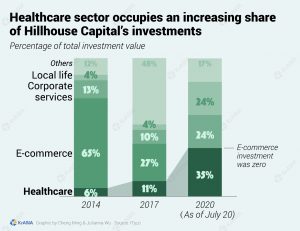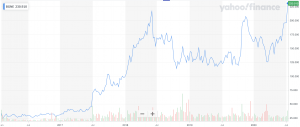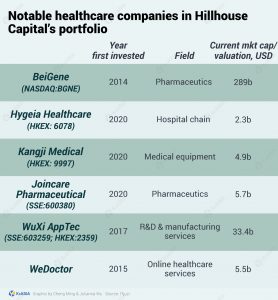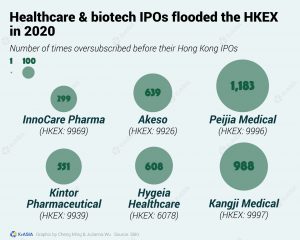While Hillhouse Capital may not be an internationally renowned name in global investor circles, the Asia-focused investment firm has quietly watched the total value of its healthcare investments grow from RMB 120 billion (USD 17.16 billion) to RMB 2.5 trillion (USD 360 billion), so maybe it should be.
In 2005, still in the nascent stages of China’s internet revolution, Zhang Lei founded Hillhouse Capital as a forward-looking venture capital fund to embrace China’s digital transformation. In almost prophetic fashion, Zhang foresaw the technological revolution in Chinese society and became an early backer of some of China’s most influential internet giants including Tencent (HKEX: 0700), Baidu (NASDAQ:BIDU), and JD.com (NASDAQ: JD).
Zhang’s stake in JD.com, which he purchased for USD 225 million, was worth USD 3.9 billion after JD.com’s Nasdaq IPO in May 2014, resulting in astronomical returns. These initial successes paid off massively and set the foundation for the next stage of Hillhouse Capital’s growth, which would be in China’s healthcare sector.

Despite the magnitude of Zhang’s success, he maintained a level-headed, patient approach to his investment philosophy. “You need to have the ability to delay gratification,” he said. “There is flowing water all around, but I only need to take a single ladle [to quench my thirst]”, according to an interview released by The Financial Times in 2014. A philosophy grounded in patience and stoicism naturally led to Hillhouse’s focus on investments in healthcare and biotechnology.
As China’s healthcare sector comes to the fore in the wake of COVID-19, the industry’s development has reached an inflection point, where companies are finally beginning to reap the rewards of an arduous and costly R&D journey that began long ago. More and more of the over 100 healthcare and biotech companies in Hillhouse Capital’s portfolio are reaching the lucrative commercialization phase.
Committing to an idea
The COVID-19 pandemic has increased the spotlight on the medical technology sector, as firms race to develop innovative solutions for the virus, together with more long-tail initiatives.
One of Hillhouse’s most successful plays in the healthcare space was its big bet on Beijing-based biotech firm BeiGene (NASDAQ:BGNE). In fact, Hillhouse invested eight separate times in BeiGene from its Series A in 2014 to its recent post-IPO equity financing in July, when Hillhouse set a record for the single largest equity investment in biotech, subscribing to more than USD 1 billion worth of BeiGene’s shares.

BeiGene, which also listed in Hong Kong in 2018 raising USD 902 million, specializes in innovative cancer drugs. In November 2019, five years after Hillhouse’s investment, it notched a milestone as the US Food and Drug Administration (FDA) approved its cancer drug Brukinsa, the first such approval awarded to a Chinese biotech company.
Weeks before the approval, the company signed an oncology collaboration and equity investment with California-based biotech giant Amgen (NASDAQ:AMGN), with Amgen purchasing just over a 20% stake in BeiGene, worth USD 2.8 billion, getting a seat on BeiGene’s board of directors.
The two companies are collaborating on commercial drug development concerning over 20 products, with BeiGene expected to commercialize at least eight products by the end of 2020, in what is the most comprehensive cooperation to date between a Chinese biotech company and its global peers.
Founded in 2010, BeiGene required significant funding to reach this point. Now in the promised land of commercial-stage drug development, BeiGene has gone from strength to strength, as Hillhouse continues to reap the rewards of its strategic foresight.

Patience and foresight
However, the successful development of BeiGene was not a one-off, but largely indicative of the patient and prudent investment philosophy lead by Zhang, and applied to the healthcare sector by Michael Yi.
On July 12, Hillhouse also invested RMB 2.2 billion (USD 310 million) in Joincare Pharmaceutical (SSE:600380), in a recent post-IPO equity round, resulting in 8% ownership of Joincare as the company’s second-largest shareholder. On the two trading days following the deal, Joincare’s share price hit the daily increase limit, having more than tripled since January of 2019.
Shenzhen-based Joincare Pharmaceutical, a firm founded in 1992, raised RMB 1.8 billion following an IPO on the Shanghai Stock Exchange in 2001. The company now encompasses a wide range of healthcare products including patent medicine, detection reagent, raw material medicine, chemical preparation, and other necessities.
The majority of Joincare’s revenue is generated by their chemical preparation segment, while it has been advancing into the field of respiratory chemical preparation, which has traditionally been dominated by foreign brands including Novartis, AstraZeneca, and GlaxoSmithKline. As the COVID-19 pandemic drove the demand for innovative solutions for respiratory ailments, Joincare currently aims to release six new respiratory products by 2021.

Looking forward
Hillhouse’s healthcare investors extend deeper, in the bid to cultivate stakes in entire ecosystems of medical technology.
WuXi AppTec (SSE:603259) is the most indicative example of this holistic approach. The Shanghai-based company provides R&D and manufacturing services to various players within the healthcare and biotechnology value chain. Its open-access platform has enabled more than 3,900 collaborators in 20 countries to access their systems.
Since the company’s Shanghai Stock Exchange IPO in May 2018, its share price has climbed nearly fivefold from RMB 21.21 (USD 3.03) to RMB 102.29 (USD 14.6) as of July 17. Capitalizing on recent reforms in the Hong Kong Stock Exchange’s listing requirements, allowing more biotech and healthcare companies to list, Wuxi AppTec (HKG:2359) executed a dual listing in December 2018 and has seen its share price more than double since then.
With a market cap of nearly RMB 250 billion, WuXi generated RMB 3.2 billion in total revenue during the first quarter of this year. The firm reported total revenue of RMB 3.2 billion, an increase of 15.09% year-on-year (YoY), while investors including BlackRock and JP Morgan have double-digit share’s in WuXi’s Hong Kong-listed entity. Since then, the company has rebounded with economic normalcy in China, resulting in China Merchant Securities reiterating its buy rating for WuXi in a July 7 report.
Bubbles can burst
In the first half of 2020, healthcare companies have barraged the capital markets, with a total of 67 medical sector IPOs across exchanges in the US, Hong Kong, and mainland China. In this bull market, many of these public offerings from Chinese healthcare companies were oversubscribed, especially in Hong Kong.

The momentum does not seem to be slowing into the second half of the year. Shanghai’s Star Market —China’s answer to Nasdaq— has also been a beneficiary of the IPO boom in healthcare, as in June two more companies, Shandong Weigao Orthopedics and Neusoft Medical Systems, filed for their public offerings.
Chinese capital markets have performed well in recent months, buoying investors sentiment in contrast with a global recession. Some fund managers in China strongly believe that the healthcare sector will breed the country’s next tech giant, comparable in size to one firm of the Baidu, Alibaba, and Tencent BAT triumvirate.
However, many predict that this bubble, especially in the healthcare and biotech sector, could soon burst.
In fact, BlackRock, the world’s largest money manager, just cashed out many of its investments in China. At the 12th Lujiazui Forum in June, Yi Gang, governor of the People’s Bank of China, warned that policy support will slowly be phased out and that investors should exercise caution accordingly and act preemptively, echoing sentiments of China’s top economic advisor Liu He who warned investors to reduce risk before the market shifts for the worse. Meanwhile, souring US-China relations continue to introduce more uncertainty into the market.
Despite short-term headwinds, Hillhouse Capital’s early entrance and patient approach to investing in healthcare have set an example for other VCs in the region, leaving the firm well-positioned as the intersection of healthcare and technology continues.

